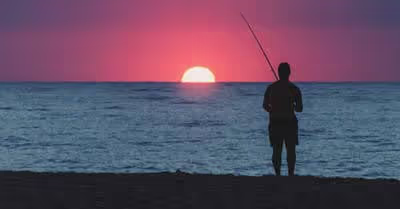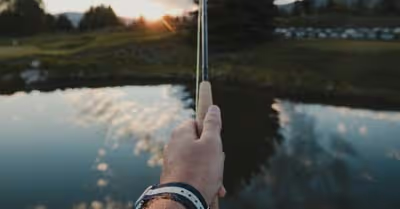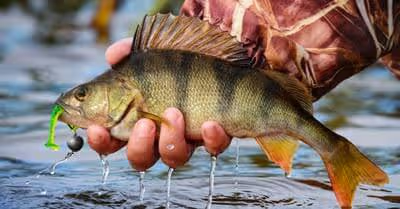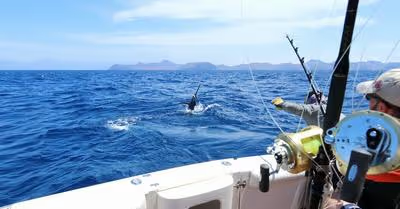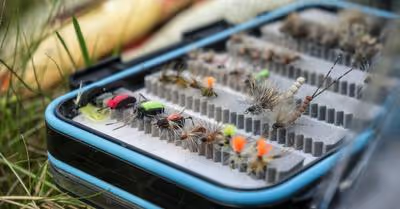Table of Contents
What Size Test Line Should You Use for Bass Fishing?
Most of the time, 10-pound test line is more than good enough even for large bass. Some anglers use 30-pound or even 50-pound or stronger line, but that is not usually necessary.
If you want to catch a real trophy fish, 10-pound line might not be enough. 7.5-pound line is a common choice. It takes some skill to reel a large bass in with 7.5-pound line, but it is still possible.
Remember that casting distance also matters a lot. The heavier your line is, the shorter your casting distance. If you use an unnecessarily heavy line, you won't be able to cast far.
There is More Sport in Using Weaker Fishing Line
Catching bass using 10-pound mono takes more skill than catching them using 50-pound braid. As your skill level goes up, you might learn how to fish with a weaker line to give the fish more of a chance to fight you.
Real anglers won't respect your skill if you use unnecessarily heavy line. It may be fine for beginners, but you should use lighter line as you get better.
Even after the fish takes your bait, it should have a chance to get away. Learn to fight a fish the right way. That includes reeling the fish in with a line that may snap if you don't do it right.
Not All Reels Can Handle Heavy Lines
Another disadvantage of heavy pound-test lines is that you can't use them on every reel. Sometimes, you can use a heavier line than the manufacturer recommends, but I wouldn't go much heavier. Using a heavier line than your reel can handle leads to problems, such as:
- The line will get tangled up too easily. This is particularly true if you use a long line.
- You could break your reel.
- You won't be able to cast your bait as far.
Breaking your reel is worse than breaking your line, so don't risk it. Don't use heavy line on a reel only designed for lighter line. Use line that is heavy enough to reel in bass, but not any heavier.
Lighter Line Sometimes Casts Farther
If you use heavier line to catch bass, it might not cast as far as lighter line will. 20-pound test mono might not cast nearly as far as 10-pound test mono line. Heavier line does not weigh the lure down, instead, it creates drag, which reduces casting distance.
Braided Line is Good for Casting Distance and Strength
Braided line both casts a long way and is strong. If you need very strong line for the fish you are casting, you might go with braided line to maintain casting distance. Since braided line is so thin, it can be very strong without creating drag.
Braided line is superior to fluorocarbon and not only mono for casting distance. Even heavier pound-test braid will usually cast farther than lighter pound-test fluorocarbon.
When catching bass, you might start with braided line as you can cast it a long way and it won't break. After a bit of practice, switch to more challenging lighter pound-test line. Try to catch bass with 15, 10, and even 6 pound-test fishing line.
Bait and Hook Size Also Affects Casting Distance
A heavier lure goes farther, not less far. A 3/4 ounce lure will pull your line a long way, a much lighter lure will not. You can cast your line very far if you both use lighter pound-test line and a heavy lure.
10-LB Bass Can Break 10-LB Lines
A beginner might assume that a 10-pound test line is good enough to catch 10-pound fish. This isn't always the case - a beginner might need a heavier line. As you get better, lighter than 10-pound line is good enough.
How to Prevent Your Line From Breaking
The first thing to do is not let your line get too weak. Every time you use your line, it will get a little weaker. When a fish pulls on your line, it may stretch, get thinner, and get closer to breaking.
If you check your line for damage before using it, you can avoid these problems. If your line is frayed, you should get rid of it now instead of using it until it breaks.
Replacing your line early is better than letting a big fish get away. You will also lose your hooks and lure if you let your line break. It's better to be safe than sorry.
Sunlight Can Weaken Your Line
You can catch bass with relatively light line as long as you take care of it. The sun is not good for fishing line. Ultraviolet light can damage monofilament line and to a lesser extent other types of line.
Learn Proper Knot Technique
Again, many people manage to catch rather large bass with 10-pound and even 6-pound line. However, no line is strong enough if it will slip off your hook. You can find detailed guides to tying basic fishing knots online.
Lubricate the Line
Keeping your fishing line properly lubricated will help prevent a big bass from snapping your line. It will also keep your reel from wearing out. If you don't lubricate a bike chain, your chain will snap, and you can also wear out your reel if you don't lubricate it.
When Should You Replace Your Line?
You should replace your line early, but not as soon as you see a small sign of wear and tear. You may have to replace fishing lines, especially mono lines, more than once a season, especially if you fish often. Sometimes, a strong line will last the whole season if you don't use it that much.
If you use braided lines, replace them when you see fraying or discoloration. Since braid is stronger than mono, your line might last for two seasons.
Fluorocarbon is very durable, doesn't absorb water, and resists sunlight. One could argue that it is even more durable than braid, although not usually as strong. Fluorocarbon lines may last for two, sometimes even more than two seasons.
Tire the Bass Out Gradually
Experienced anglers can pull big bass in with much weaker lines than amateurs. An expert doesn't need a 30LB line to pull in a big bass, sometimes less than 10 pounds will do. This is because your technique is as important as the strength of the line you use.
If you pull your hardest and try to reel the bass in right away, your line will often break. You aren't supposed to fight a fish that way.
Instead, let the bass try to escape without pulling your hardest. Then, pull harder and pull it towards you again. After it tries to escape a few times, the bass will be too tired to pull away from you again.
Patience is Key
If you try to pull a big fish into the boat right away, you can easily lose the fish. Even if your line is too strong to break, the hook may still pull out if you try to reel it in as fast as possible. Take your time, even if you are using a very strong fishing line.
Use Heavier Pound-Test in Thicker Weeds
Since natural obstacles can break your line as easily as big fish can, you might need much stronger line if there are thick weeds. If you are fishing around lily pads, 10-pound test line won't do.
Recent Articles



